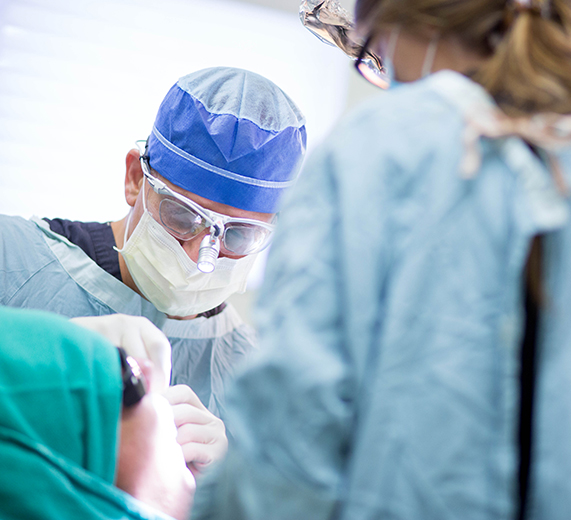Facial
Trauma
Facial trauma can include displaced or knocked out teeth, skin lacerations, fractures, burns, and bruising due to accidents, interpersonal violence, and disease. Due to their very nature, injuries to the face can be traumatic on both a physical and emotional level, whether the injury is minor or severe.
The proper treatment of facial trauma is crucial. It requires the expertise and artistry of a highly skilled oral and maxillofacial surgeon, one who is experienced in emergency care, reconstruction, and long-term rehabilitation.
Dr. Jones is specifically trained in the evaluation and treatment of facial trauma based on the location and severity of the injury as well as the age and overall health of the patient. Furthermore, he understands the importance of addressing both physical and emotional healing and developing a personalized treatment plan that will ultimately preserve the function of the affected area and the cosmetic appearance of the patient over the long term.


Facial injuries generally fall under three categories: soft tissue injuries (affecting skin and gums), bone fractures, and injuries to specific facial regions and functions, for example teeth, salivary glands, eyes, or facial nerves.
Soft Tissue Issues Most soft tissue injuries can be addressed with sutures. Your doctor will first inspect underlying structures, such as those associated with nerves and salivary glands, and assess damage and functionality. Then, the injury will be treated and repaired with utmost care and attention to achieving the best cosmetic result possible.
Bone Fractures Cheek, nose, eye socket, or jaw bone fractures can affect a patient’s speech, sight, and ability to eat and breathe properly. As with a broken arm or leg, stabilization of the fracture is necessary for proper healing and successful cosmetic restoration.
Jaw wiring is an option for stabilizing fractures to upper or lower jaw. A more advanced technique called rigid fixation involves the use of small plates and screws to ensure the bones and surrounding tissue affected by the trauma remain fixed and stable during the healing process. Rigid fixation has been shown to benefit the patient in terms of reduced recovery time. In more severe cases of bone fractures of the maxillofacial region, more complex surgical repair may be required.
While the functional needs of the patient are of the highest concern, restoring their physical appearance is also a top priority. Special attention is paid to minimizing incisions so that scarring is minimal and a patient’s appearance is affected as little as possible.
Tooth Injuries Teeth that have been displaced or knocked out are repaired using procedures performed by various dental specialist. For example, restorative or cosmetic dentists generally rebuild broken teeth, and endodontists perform a root canal when needed. Often, a combination of procedures will be required and restoration will involve various specialists. As part of our team approach to patient care, your Sandhills oral surgeon will work with your dentist to develop an interdisciplinary treatment plan that will benefit you most.
Oral surgeons are involved when the underlying bone structure has been fractured or when surgically implanting the displaced tooth is an option. Bone fractures require splinting (wiring or bonding teeth) and implanting involves reinserting the tooth, if it is salvageable, or replacing the tooth with dental implants.
Oral and maxillofacial surgery can provide pain relief, restore functionality, and alleviate many cosmetic concerns that result from facial injury and trauma. If you experience facial trauma of any kind, it is vital to seek treatment as soon as possible.
Please contact us to make an appointment at our Fayetteville office or for more information about our team approach to treating facial trauma.









